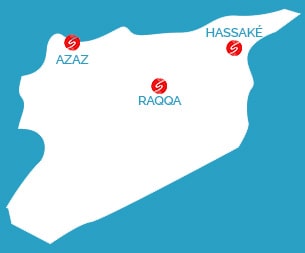
Context
5.3 million people were displaced within Syria, whichwas once again the largest number of internally displaced people in the world. Their needs remained extensive.
The country’s economic situation continued to deteriorate, with high inflation, the devaluation of the Syrian pound and the rising cost of basic goods. The number of people who were able to meet their own essential needs and access basic services fell again. 85% of households could not meet their own vital needs.
Syria was also faced with a food crisis, recurrent winter storms, a cholera epidemic, a severe water crisis and the increasing impact of climate change. All these factors have led to additional population movements.
- 22.1 million inhabitants
- 150th out of 191 countries on the Human Development Index
Our action

-
Mission
opened in 2012 -
Team
26 international staff
272 national staff - Budget 20.79M€
Despite the complex environment in Syria, our NGO managed to maintain its capacity to deliver rapid, large-scale responses, as well as offering longerterm support when possible. Our teams provided sustainable solutions for around one million Syrian men, women and children, by rehabilitating many key facilities (schools, health centers, irrigation channels, water networks, etc.). They also supported small companies and agricultural activities.
In parallel, our organization carried out activities to protect people against the cold following winter snowstorms, implemented a coordinated response to the cholera epidemic and provided multi-sectoral assistance to displaced people. Hundreds of thousands of people benefited from these activities.
Institutional and private funding partners SRTF, ECHO, CDCS, ICSP, USAID – BHA, CIAA,
OCHA Pooled Fund, Start Fund, GIZ
Operating partners Action for Humanity, UPP, Relief International, PIN, Concern Worldwide, Care UK, Ihsan Relief and Development
Our impact

Vital emergency response to meet immediate, basic needs
- Complete “Water, Sanitation and Hygiene” (WASH) kit
- Protection against the cold in winter
- Shelters, essential items and financial assistance

Provision of essential services to the most vulnerable communities affected by the protracted crisis
- Basic WASH assistance package
- Construction of decent shelters and distribution of basic necessities
- Food assistance, agriculture and gardening projects

Restoration of public services, economic capacity and community resilience
- Support for micro, small and medium-sized companies
- Rehabilitation of key infrastructure (water plants and networks, irrigation channels, private shelters, health facilities, schools)
Should you have any questions, please contact Thomas Janny.

Vacancies
At head office
Worldwide
Internships
